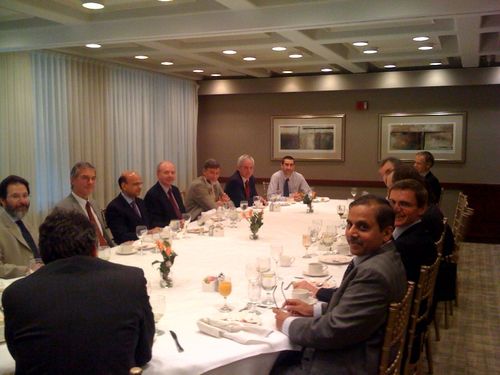Posted by Frans Ronsholt and Brandon Lundberg1
The PEFA Steering Committee met in Washington, D.C. on June 11 and 12 for its regular semi-annual meeting, with the IMF as the rotating chair and host. Comprised of representatives of each Partner institution,2 the Steering Committee provides direction to the PEFA Program while the Secretariat implements the joint activities.
This Steering Committee meeting marked the first occasion for the Partners to discuss new initiatives since the inception of Phase III (2009–11) of the PEFA program. In addition to the regularly scheduled update of progress on activities by the Secretariat and that of the Partners’ with the PEFA instrument, some of the highlights of the two-day discussion included possible measures to improve quality assurance; fine-tuning the measurement framework; a comparison of the IMF’s Fiscal ROSC and the PEFA assessment; and an update on progress of the guidance note on the use of PEFA reports for reform sequencing. The meeting also confirmed the program’s close and continuing engagement with the OECD-DAC in pursuing the Paris Declaration objectives and the Accra Action Agenda on PFM issues through the new Task Force on PFM.
Improving Quality Assurance
The issues related to quality assurance were centered on the findings of the draft Monitoring Report 2009, the third such report since the launch of the PEFA Framework in 2005, and an issues note presented by the IMF. The Secretariat noted that practically all PEFA-based PFM assessment reports are now being submitted to the Secretariat as part of the quality assurance arrangements for the individual assessments, and that compliance with the PEFA Framework in terms of meeting the technical requirements for scoring the indicators has reached a satisfactory high level in final reports. However, a number of process aspects—critical to the success of an assessment in terms of acceptance and utilization—still need to be addressed more effectively. Those aspects, such as the use of external peer reviewers, are decided during the initial planning for the assessments. It is also a concern that only a fraction of the concept notes and terms of reference for the planned assessments are subject to quality review by the Secretariat. Repeat assessments are now also emerging in significant numbers and the experience so far is that assessors would benefit from specific guidance on how to reflect performance changes over time in the reports. To consolidate the gains already made and address the remaining issues, the Steering Committee agreed to (i) strengthen identification and information sharing on upcoming assessments; (ii) improve guidance on the establishment of peer review arrangements; (iii) share concept notes and terms of references with the Secretariat for comments; (iv) encourage assessment teams to send revised reports to the Secretariat for follow-up review; and (v) develop guidelines for repeat assessments.
Fine-tuning of the Framework
Some feedback from users has suggested that in the case of a couple of the PEFA indicators, the score is not always a reliable measure of the actual performance level. The Steering Committee asked the Public Expenditure Working Group (a group of technical experts drawn from the IMF, the World Bank, and the PEFA Secretariat) to investigate these concerns in detail and report back on the merit of each of the concerns with concrete proposals on how to address them. No further fine-tuning is foreseen during Phase III of the program.
The Fiscal ROSC and the PEFA Framework
The IMF tabled a note summarizing the main similarities and differences in the approach and coverage of fiscal ROSC and PEFA assessments. While the analytical instruments were developed at different times and for different purposes (the ROSC focuses primarily on transparency and accountability, while the PEFA tool additionally considers PFM system performance), some of the overlapping features have called into question whether or not there should be integration or at least better coordination in utilization of the two tools. The Steering Committee recognized that the similarities between the two analytical tools require that their use in any country be closely coordinated, if possible through combined missions, as this is critical to the success of the strengthened approach. A first combined mission for the two types of assessment will be piloted during the coming year.
Progress on a Guidance Note on the Use of PEFA reports for Reform Sequencing
A consultant has been engaged to prepare a guidance note on this topic. The Steering Committee discussed the consultant’s inception report. It laid out the methodology of analysis, an overview of current literature, and a listing of the proposed case study countries. The guidance note will be narrowly focused on the potential contribution of a PEFA assessment as one of the inputs to the process of prioritizing and sequencing PFM reforms. The target is to have the guidance note produced by the end of the year.
The next PEFA Steering Committee meeting is scheduled for December 2009 in Oslo and will be hosted by the Norwegian Ministry of Foreign Affairs.
[1]Frans Ronsholt is the head, and Brandon Lundberg a Monitoring and Evaluation Consultant, of the PEFA Secretariat. The Secretariat is housed at World Bank headquarters in Washington, DC.
[2]The World Bank, the European Commission, the UK Department for International Development, the Swiss State Secretariat for Economic Affairs, the French Ministry of Foreign Affairs, the Norwegian Ministry of Foreign Affairs and the International Monetary Fund.






